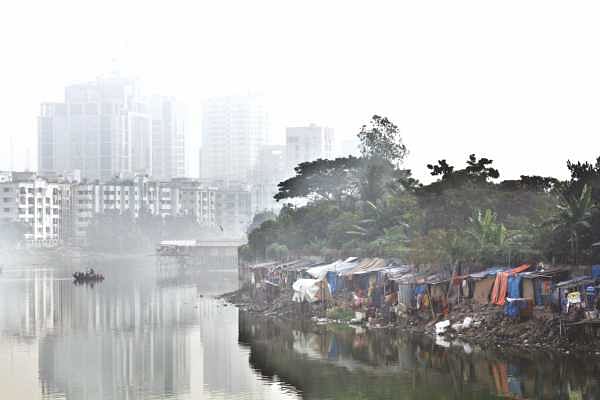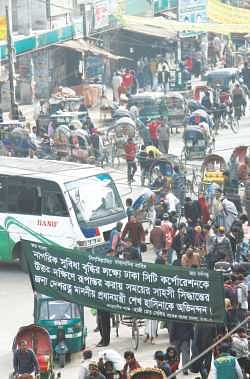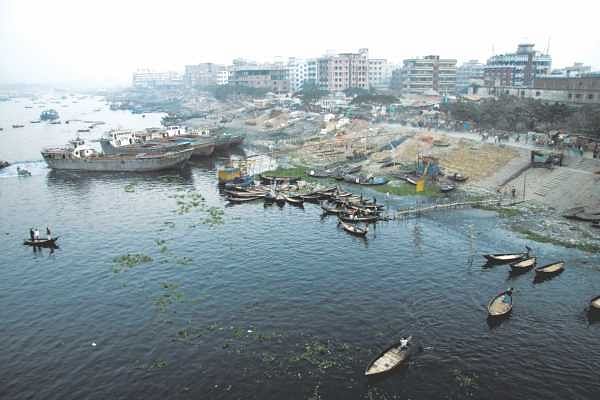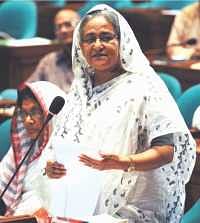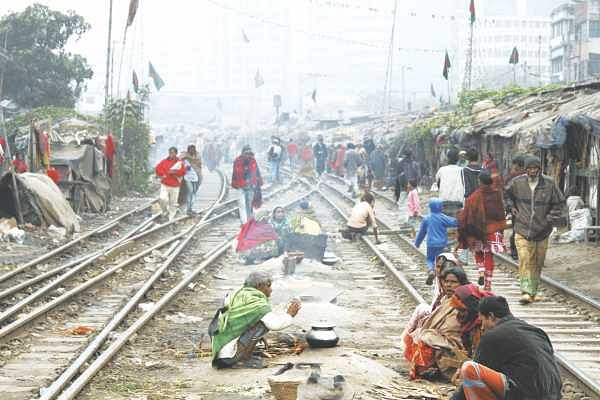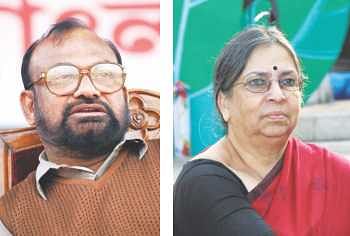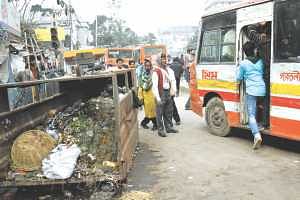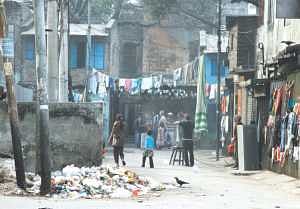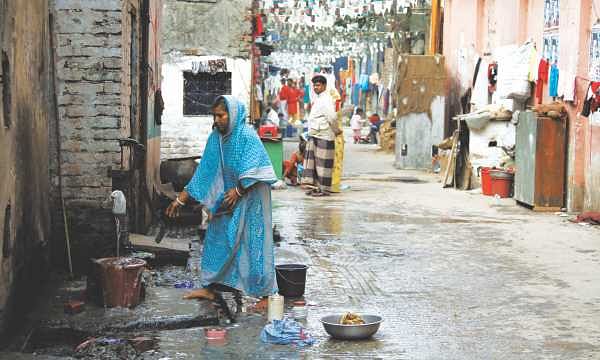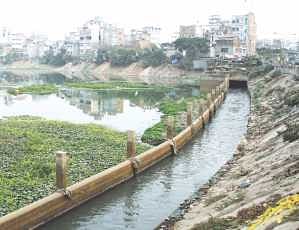| Home - Back Issues - The Team - Contact Us |
 |
| Volume 10 |Issue 49 | December 30, 2011 | |
|
|
Cover Story
Tangled Up in Two Corporations In the 150-year-old history of modern Dhaka, its administration had never been split. It was done in a mere four minutes. The bifurcation was done by the Awami League-led government without taking into their confidence even the Members of the Parliament (MPs) belonging to the city, let alone the opposition and the junior partners of the Mohajote. Akram Hosen Mamun The people of the city, who are constantly coping with three lanes of garbage heaps on four-lane streets and clogged drains and ditches that cannot handle minutes of downpour, have reason to be deeply frustrated with the city corporation. Now they are asking, why divide the corporation instead of removing the already existing hurdles that make their lives intolerable? Let's take a look at the official or less charitably, the government's party line on the issue. So far the arguments presented are mostly devoid of any reference to issues of empowering, democratising, increasing budget allocation or any steps that would make the ailing organisation efficient.
Prime Minister Sheikh Hasina has told the Parliament, to justify the dividing of the 400-year-old city: “The DCC has been divided into two zones only to deliver better civic service to the doorsteps of the residents. Had there been adequate money with the government, it would have split Dhaka City Corporation into four zones instead of two.” She has hastened to add that those against the division “may have other intentions. In my view, they are against it for the sake of opposition, misleading the people and bringing the development activities of the government into question.” Her cabinet's LGRD Minister was also quick to come up to her rescue. He said, “Dhaka city is not being divided by barbed wire. Passports or visas will not be necessary to travel from one part of the city to another.” However, not everyone agrees with him. Even though she might not need a passport, Tamara Khan is not happy. “To me, as a tax payer, the split of the city corporation means more bureaucracy and waste of public money,” says Tamara, a young writer, who lives in Dhanmondi. Tamara believes instead of making life easier for the ordinary citizens, the bifurcation will make it difficult. She says, “I can't find words to express how the decision of the government sickens me. I don't even want to know which part of the corporation I belong to now.”
Badiul Alam Majumdar, central general secretary of Sujan (Citizens for Good Governance) could not agree more. “The logic behind the whole thing was decentralisation, through which civic facilities are supposed to increase,” he says. “But the problems that are eating away our system from the inside are corruption, inefficiency, bureaucratic-administrative mires, and extortion. Dividing the administration while bypassing all these problems will yield nothing. Moreover, two corporations with two administrations will be expensive.” The opposition is not happy with the decision either. The BNP has been critical of the government's move from the very beginning. It has also observed a day long hartal in protest of the split. The last DCC polls were held in 2002 and the tenure of the incumbent mayor Sadek Hossain Khoka and councillors expired in May 2007. Polls for the DCC could not be held for many reasons, one being the state of emergency in 2007-2008. It was through the president's signing of the bill that made splitting the DCC into law, thereby ending the long tenure of Mayor Sadek Hossain Khoka and all the councillors of Dhaka City Corporation.
The birth of the bill that split Dhaka is also cloaked in mystery. By the end of last November, a bill to split the corporation was submitted to the parliament. Then, in what seemed like a fast forward playback, a report on the bill was submitted and through some major changes to the Local Government (City Corporation) Act, 2009, Dhaka City Corporation (DCC) was split on November 29, within six days of the submission of the bill.
Sadek Hossain Khoka, now the chief of Dhaka city unit BNP says: “We are against the split. We observed hartal in protest. In opposing the decision, we are only expressing our solidarity with common people, particularly the civil society, the urbanites, the ward councillors, and people who are involved with the administration of the city.” He adds that if his party gets to form government again, it will “establish a central, undivided administration again.” It is important to remember that when BNP was in the office, it didn't take any steps to strengthen local government or to decentralise administration in any serious sense. One may also remember that the choked sewerage, clogged up drains, water supplies and senseless waste management were never any better when BNP was in office. While most of the residents oppose the government's move, they are also critical of the BNP's deeds, despite the party's claims to the contrary. “It is completely obvious that the decision to split the DCC without even addressing the most obvious shortcomings of the civil service is made for petty political gains,” says Hasan Al Zayed, an assistant professor at the Department of English at East West University.
Zayed also says that the BNP is taking the opportunity to win public support through rhetoric and high-sounding adjectives. “They didn't do anything differently when they were in the office,” he adds. Policy analysts have also found that the appointment of unelected individuals as administrators not only defies the most elementary ideals of a functioning democracy but is also inconsistent with the constitution. Moreover, the amended law does not even specify the period during which these administrators can hold office. Sultana Kamal, former adviser to the caretaker government and a human rights activist, says, “The move to amend the existing law to run the corporation with unelected administrators goes against the spirit of the local government institution, as enshrined in the constitution.” Badiul Alam Majumdar also sees the appointment of unelected administrators, as a violation of our constitution. “This is also a violation of court. In 1992, the court's decision in Kudrat-E-Elahi Panir versus Bangladesh case was to hold elections within six months. But it has been twenty years since, and nobody cares about implementing the decision.” Commenting on the likely effects of establishing two administrations to govern the city, Majumdar says, “We'll have a dual administration that will lack internal coordination. An obvious outcome is the significant increase in spending public money.” He predicts that one corporation will earn more than the other while the budget allocation for the two corporations will remain a dilemma. “People of one corporation will be privileged while the other will get fewer facilities.” In a similar note, Sultana Kamal says that better civic service depends on a service-oriented mindset, efficiency, transparency and the accountability of the institution. As it is often the case, the opinion of the people affected, namely the citizens of Dhaka, has remained irrelevant in the whole process. “An issue of a fundamental change like this should have been placed both in parliament and the public domain for debate, as required in a democratic system,” Kamal adds.
Considering the frustratingly time-consuming and bureaucratic nature in which government policies are designed and implemented in this country, it is not hard to predict that the move to bifurcate the administration will take years to complete. Sadek Hossain Khoka predicts that the budgetary and administrative complications of the divide may “take twenty years to be solved. There are financial issues; there are issues of dividing the Nagar Bhaban and its assets and workshops. There is a mechanical division in Sayedabad. I don't know how they are going to divide that.” The number of DCC employees is about 26,000, who expressed their dissatisfaction over the government move by holding rallies and meetings. Many other employees have retired from the corporation in the past. According to Khoka, questions will now arise about the retirement fund.
The prime minister has said that the divide is necessary because the population of Dhaka is increasing everyday and that the only reason behind the decision is to make civic services more efficient. Critics of the move do not accept this argument. They say that while asserting that, other more important, logical and pragmatic steps could have been taken to handle the ever increasing population of the city. “Even if we assume, only for the sake of arguing, that one mayor can't possibly manage such a huge population, I would say that the law they have passed by dint of their majority in the parliament, and the appointment of unelected administrators, goes against the premises of the constitution,” says Sultana Kamal. The process of elections—both mayoral and parliamentary—is something that needs be scrutinised. People have to literally buy party nominations and 'blessings' before taking part in elections. One can also become the chosen leader in exchange for money. In this conjecture, Zayed opines that the electoral procedure “is highly flawed and essentially elitist. Only the people with power and privilege will be able to contend and win the elections. The whole thing is advertisement-driven.” Around the city some people have become quite ecstatic about the government's decision. The ones who dream to be in one of the mayoral offices praise the premier for her 'brave' and 'timely' move by putting up colourful posters and banners. As a prelude to their real campaign for the election, some have erected quite impressive gates at the busiest intersections of the city, causing yet another bottleneck in traffic. “Usually the person, who spends the most, gets the most effective advertising campaign, which is highly likely to make that person win the election,” Zayed says. “Questions of political commitment, honesty and principles are virtually irrelevant.” It is only too obvious that some people will immensely benefit during and after the changes take effect. It also gives the BNP an issue and an opportunity to remain politically relevant. But the majority, the common people, who do not get the most elementary civic rights like a functioning sewerage, water supply, and garbage disposal, will have to continue their miserable life in the city. “For better or worse, the number of administrations and elections will not make a big difference in the lives of common people,” says Zayed. “As long as the existing electoral process stands, it'll boil down to the same thing: the ruling class and the concentrations of power from both parties will take advantage.” It seems the people of this city have again been imposed with a state decision that hardly gives any hope that the existing nightmarish conditions of day to day life will change. Without the announcement of when a clear timeline for mayoral elections will take place and with the possibility that the split will create more confusion and logistical chaos, Dhaka's citizens await the effects of the split with a great deal of skepticism. Citizens express their opinion about the bifurcation of Dhaka. AMIRUL RAJIV
Copyright (R) thedailystar.net 2011 |
||||||||||||||||||||||||||||||||||||||||
